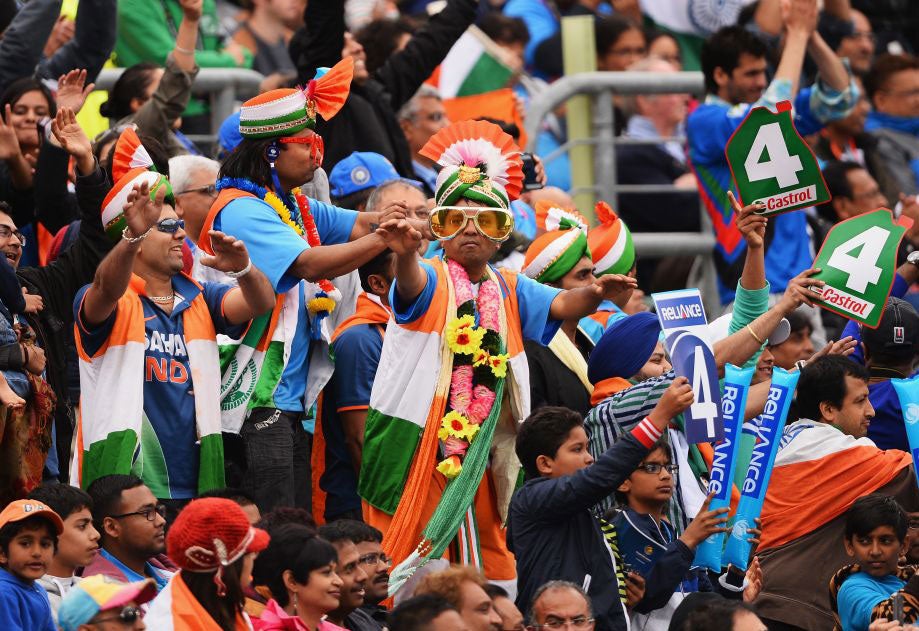Champions Trophy: A dead rubber with as much passion and intensity as a final
India are through and Pakistan are out but today’s meeting means the world to both sides

Your support helps us to tell the story
From reproductive rights to climate change to Big Tech, The Independent is on the ground when the story is developing. Whether it's investigating the financials of Elon Musk's pro-Trump PAC or producing our latest documentary, 'The A Word', which shines a light on the American women fighting for reproductive rights, we know how important it is to parse out the facts from the messaging.
At such a critical moment in US history, we need reporters on the ground. Your donation allows us to keep sending journalists to speak to both sides of the story.
The Independent is trusted by Americans across the entire political spectrum. And unlike many other quality news outlets, we choose not to lock Americans out of our reporting and analysis with paywalls. We believe quality journalism should be available to everyone, paid for by those who can afford it.
Your support makes all the difference.Misbah-ul-Haq said it all. "Whenever we play each other it’s like a final for everybody," Pakistan’s captain told an expectant audience yesterday with his habitual solemnity. It was what they wanted to hear.
Pakistan and India meet in the sides’ final pool B match of the Champions Trophy at Edgbaston tomorrow. It is not quite imbued with the fervour anticipated, since Pakistan have already been eliminated from the tournament after losing both their matches so far and India have already qualified for the semi-finals having won two.
But that is to overlook an element to these contests that goes beyond bragging rights. Cricket matches between these two countries are a cultural phenomenon. MS Dhoni, the India captain, said the confrontations had mellowed a little since the 1980s and 1990s for the good of cricket, though the intensity remained. Being the canny operator he is, Dhoni had a veiled warning for Pakistan.
“Well, there are two ways to look at it,” he said. “It depends on what they are thinking. If their thinking is they have nothing really to lose, let’s go out, be expressive on the field, don’t bother about the result, then they can be dangerous. But if the thinking is they have not qualified, this is a game against India, let’s win this game so that we have it as a consolation prize, they’ll be in big trouble.”
When the teams played each other in the semi-final of the last World Cup, the prime ministers of both countries attended and used the occasion to hold formative political talks. The security cordon around the stadium in Chandigarh had a ramshackle quality to it, but that is not to undermine its seriousness.
The alert will not be quite so high in Birmingham tomorrow, though the ground will be full and the misbehaviour of some Pakistan supporters earlier in the competition will have been noted. If Pakistan win – and it would, of course, be typical of them to amass a mountain of runs after failing twice with the bat – it would almost atone for their previous failings with their supporters at home.
It is another phenomenon of sorts that the team still manages to stir such deep passions. More than four years have passed since they last played an international match in their own country, yet this itinerant band has still managed to compete at a high level.
Since the boycott of their country, caused by a murderous attack on the Sri Lanka team coach as they travelled to the ground in Lahore for a Test match, Pakistan have won marginally fewer Tests, 12, than they have lost, 15, but won more one-day internationals (48 to 46) and Twenty20s (28 to 21).
It is a remarkable feat and this tournament in particular and cricket in general might have been the better for their continued involvement. Misbah knows well enough that they have failed to progress because of miserable batting which has been the antithesis of what Pakistan’s limited-overs cricket is about.
India, the World Cup holders, have been splendid in the Champions Trophy. Urbanely led by Dhoni, they have unearthed a new star in Shikhar Dhawan, scorer of successive hundreds as an opener. This is his second coming in international cricket and he has been resplendent.
Dhoni estimated that the difference between this and Dhawan’s first attempts to become an international player was twofold. In the early days, he was trying to be a wicketkeeper as well as a batsman, which is always hard. He was also looking over his shoulder, worried about his place in an age when only the megastars of Indian cricket could be sure.
India’s fielding has been a revelation and they appear to have judged beautifully the art of peaking for a major tournament. In matches overall between the sides, Pakistan have a healthy lead in the number of victories, 71 to 49, though since 2000 it is a more evenly balanced 24-22.
They have met twice in England before, in the 1999 World Cup and the 2004 Champions Trophy, with one victory each. A fair exchange might be for Pakistan to win today and India to win the tournament. There is no saying who would be happier.
Join our commenting forum
Join thought-provoking conversations, follow other Independent readers and see their replies
Comments